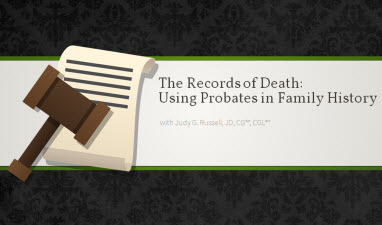New Ancestry Academy course
When Ancestry launched Ancestry Academy back in April, it did so with a lot of hoopla, a core of course offerings and a promise.
The hoopla — a description of this new entry into the genealogical-education-at-home field — included the fact that this was “a new educational website that offers exclusive, high-quality video courses taught by genealogy and family history experts. Ancestry Academy courses cover a wide range of relevant family history topics and offer something for genealogists of all levels.”1
 Courses are “broken into a series of short lessons that let you learn when you want and how you want. Watch a course all the way through or pick and choose the lessons most interesting to you.” And there are short quizzes you can take at the end “to make sure you’re getting the most out of every course.”2
Courses are “broken into a series of short lessons that let you learn when you want and how you want. Watch a course all the way through or pick and choose the lessons most interesting to you.” And there are short quizzes you can take at the end “to make sure you’re getting the most out of every course.”2
The initial course offerings included included things like “DNA 101: An Insider’s Scoop on AncestryDNA Testing,” with Anna Swayne. Or “And Seek and Ye Shall Find: Become an Ancestry Search Expert,” with Anne Gillespie Mitchell. They were focused mostly on Ancestry resources, and were — and remain — mostly free. Subscriptions are $11.99 a month or $99.99 a year to access all courses, and access to Ancestry Academy is included in Ancestry’s new All Access subscription.3
Each course is introduced in a brief segment that’s a conversation between the instructor and Laura Prescott, Director of Ancestry Academy, and you can find a good overview of how Ancestry Academy works and what to expect in the review by Pam Cerutti at Eastman’s Online Genealogy Newsletter.4
And that promise to add new courses regularly? It’s been kept. With courses like “Who is That Tick Mark? Using Early Census Records,” with J. Mark Lowe. “Brother vs. Brother: Exploring Civil War Ancestors,” with Amy Johnson Crow. “The Mystery of Manuscripts,” with Pamela Boyer Sayre. “Tracing French-Canadian Ancestors and Learning Their Stories,” with David Ouimette.
And, now, one more new one. “The Records of Death: Using Probates in Family History.” Presented by The Legal Genealogist.
The course description says it all:
The probate process, where courts supervise the passage of property from one generation to another, is a rich source of genealogical information. Whether your ancestor left a will or died without one, whether rich or poor, landowner or tenant, male or female, there may well be records of death that provide invaluable clues. Understanding those records, and the laws under which they were created, is essential to any complete family history.5
In addition to the introductory and wrap-up dialogues with Laura Prescott, the course has 10 segments:
The Lingo of Probate Law; Estates with a Will: Procedures; Estates with a Will: Records; Estates without a Will: Procedures; Estates without a Will: Records; Special Records of Widows: Dower & Set-asides; Special Records of Children: Guardianships & Indentures; Finding Probate Records; Using Probate Records; and Limits of Probate Records.
It was a blast to put the course together, and great fun working with Laura and her team.6
Come check out Ancestry Academy. As EOGN editor Pam Cerruti notes, “the content is robust and has something to offer all levels of genealogists.”7
SOURCES
- “Introducing Ancestry Academy, a New Way to Learn About Family History,” Ancestry blog, posted 16 Apr 2015 (http://blogs.ancestry.com/ : accessed 2 Aug 2015). ↩
- Ibid. ↩
- That includes access to Fold3.com and Newspapers.com as well. ↩
- Pam Cerutti, “Hands on with Ancestry Academy,” Eastman’s Online Genealogy Newsletter, posted 1 July 2015 (http://blog.eogn.com/ : accessed 2 Aug 2015). ↩
- “The Records of Death: Using Probates in Family History,” Ancestry Academy (https://www.ancestry.com/academy/ : accessed 2 Aug 2015). ↩
- I would kill for permanent access to the hair and makeup person… ↩
- Cerutti, “Hands on with Ancestry Academy.” ↩



Nice write up, Judy, and I’ll definitely go check out some of the courses – including yours. One can never get too much of Judy Russell!
And may I say that your Sources are a constant source of amusement to me – I snorted my morning coffee reading #6.
Cheers!
As my friend and mentor Elizabeth Shown Mills would be the first to say, citation is an art, not a science — one must have some fun writing footnotes!!! 🙂
Nonetheless, I am going to have to do some careful editing of some of mine before turning them out in public.
🙂